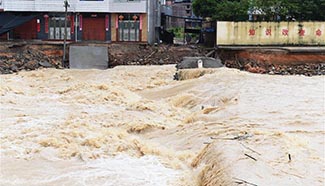HONG KONG, July 10 (Xinhua) -- China and ASEAN should step up cooperation in industrial capacity to stimulate mutual development and achieve win-win results, a Chinese envoy has told Xinhua.
During an exclusive interview, Ambassador to the Association of Southeast Asian Nations (ASEAN) Xu Bu said cooperation in industrial capacity should be a priority in cooperation between the two sides, as it would give new impetus to the development of both China and ASEAN.
Since the establishment of the ASEAN Community last December, the regional bloc is tasked with not only creating a single market of some 600 million people, but also establishing a single production base with free flow of goods, investments, services and skilled labor, while China is working to realize its "two centenary goals," the ambassador said.
The world's second-largest economy is aiming to double the 2010 GDP and per-capita income of urban and rural residents and complete the building of a moderately prosperous society by 2020; and to build China into a modern socialist country that is prosperous, strong, democratic, culturally advanced and harmonious by the middle of this century.
To achieve their respective development goals, both sides need to "create new channels and break new grounds," Xu said.
China has distinctive advantages in conducting industrial capacity cooperation with ASEAN, as the country's economy has entered a mature stage of industrialization that boasts abundant capital, high levels of technical expertise and a large number of competitive industries, including high-speed railway, building materials, non-ferrous metals, computer, mobile phone and new energy.
"Cooperation with China would help break the infrastructure and capital bottleneck in ASEAN's industrialization and urbanization process, and drive economic growth," he said.
Xu noted that early gains have been made in bilateral industrial capacity cooperation. Some 23 overseas economic and trade cooperation zones have been set up by Chinese enterprises in ASEAN members, attracting 421 Chinese firms and generating a total output value of 21.3 billion U.S. dollars by January.
In addition, positive results have been witnessed in areas such as industrial park development and high-speed railway construction, as demonstrated by progress seen in the China-Laos railway and Jakarta-Bandung high-speed rail projects, as well as a stainless steel plant in Indonesia set up by Chinese investors.
The China-proposed Asian Infrastructure Investment Bank and Silk Road Fund, among others, have provided financial support to bilateral cooperation, said the ambassador.
To further boost cooperation in industrial capacity, Xu said the two sides should enhance synergy between their respective strategies and initiatives: "China is willing to align its international industrial capacity cooperation drive and Belt and Road Initiative with the ASEAN Economic Community Blueprint 2025 and the Master Plan on ASEAN Connectivity, as well as development plans of respective ASEAN member states."
China and ASEAN should also prioritize key sectors, including iron and steel, cement, engineering, power and building materials, to improve efficiency of their cooperation, he said, adding policy and financial support for the cooperation need to be further beefed up.
Meanwhile, the major role of enterprises in the cooperation should be respected, and technical assistance and guidance should be provided to them to encourage their participation, Xu said.










